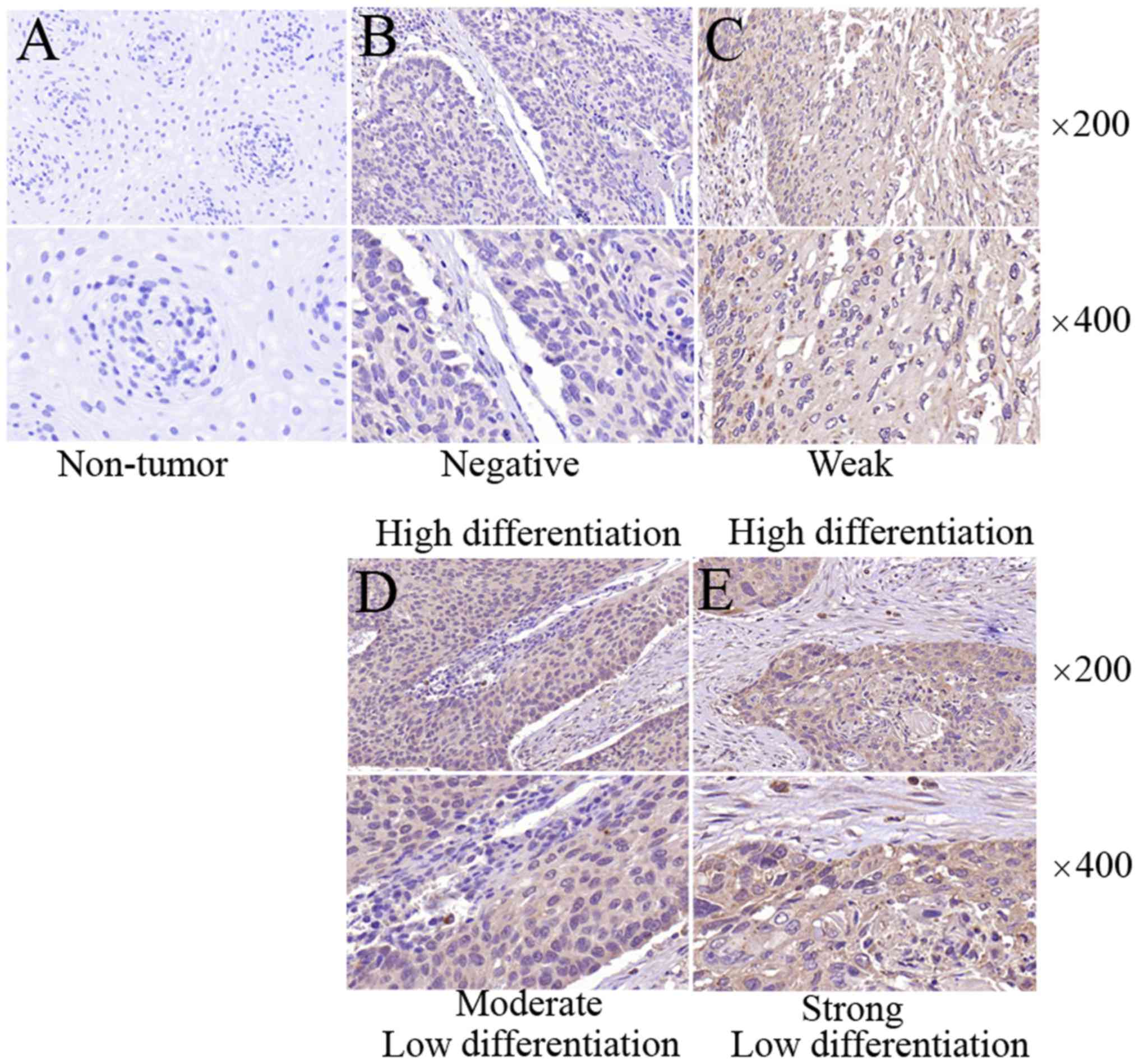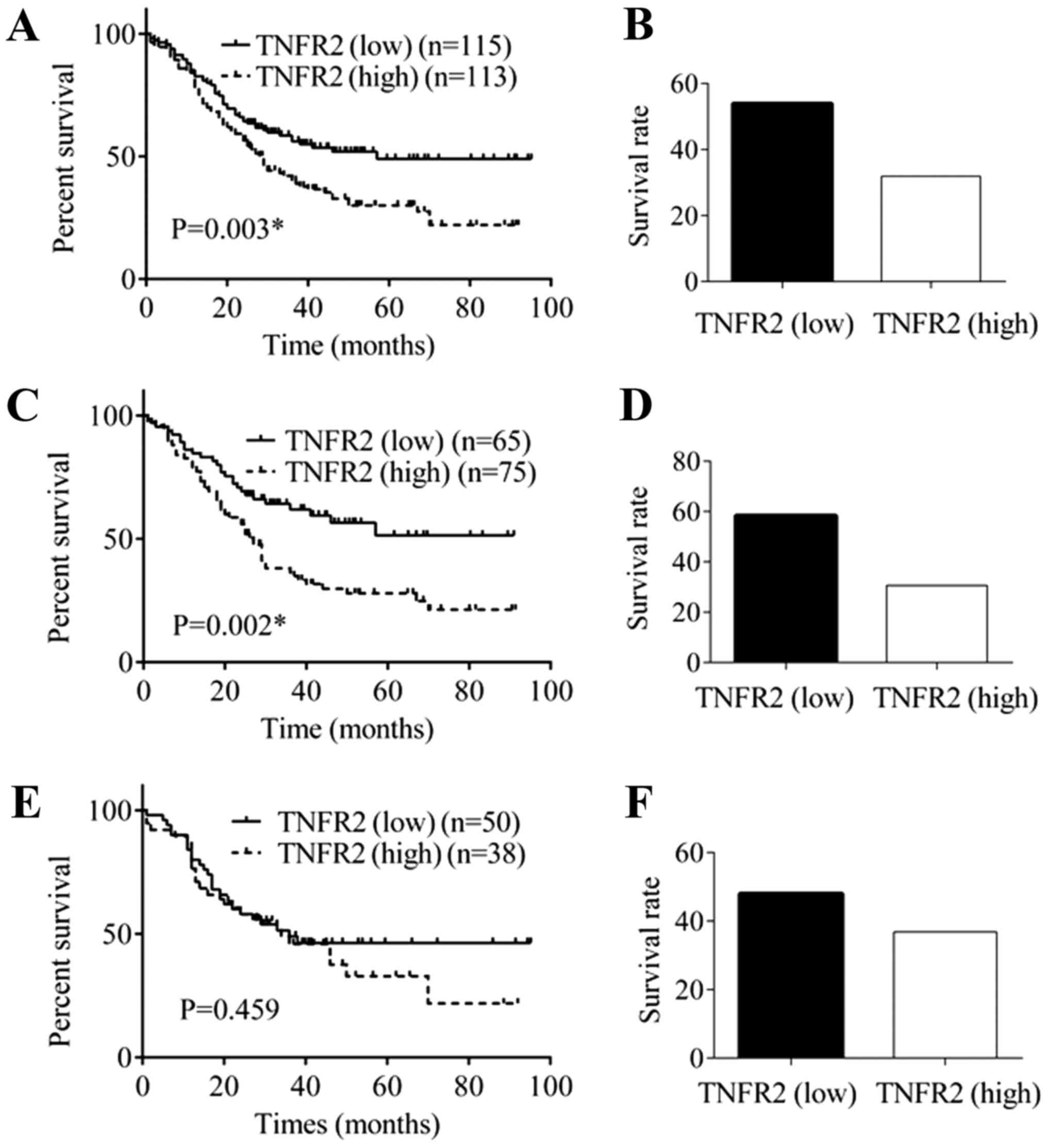|
1
|
Feng J, Qi B, Guo L, Chen LY, Wei XF, Liu
YZ and Zhao BS: miR-382 functions as a tumor suppressor against
esophageal squamous cell carcinoma. World J Gastroenterol.
23:4243–4251. 2017. View Article : Google Scholar : PubMed/NCBI
|
|
2
|
Han G, Wu Z, Zhao N, Zhou L, Liu F, Niu F,
Xu Y and Zhao X: Overexpression of stathmin plays a pivotal role in
the metastasis of esophageal squamous cell carcinoma. Oncotarget.
8:61742–61760. 2017.PubMed/NCBI
|
|
3
|
Jiang Q, Chen J, Zhang B, Niu J and He Y:
Prognostic Significance of periostin and mammalian target of
rapamycin (mTOR) in locally advanced esophageal squamous cell
carcinoma. Med Sci Monit. 23:3200–3208. 2017. View Article : Google Scholar : PubMed/NCBI
|
|
4
|
Dong Q, Fu L, Zhao Y, Liu Y, Li Q, Qiu X
and Wang E: Derlin-1 is a target to improve radiotherapy effect of
esophageal squamous cell carcinoma. Oncotarget. 8:55135–55146.
2017. View Article : Google Scholar : PubMed/NCBI
|
|
5
|
Li X, Zhao L, Zhang W, Yang C, Lian Z,
Wang S, Liu N, Pang Q, Wang P and Yu J: Prognostic value of
supraclavicular nodes and upper abdominal nodes metastasis after
definitive chemoradiotherapy for patients with thoracic esophageal
squamous cell carcinoma. Oncotarget. 8:65171–67185. 2017.PubMed/NCBI
|
|
6
|
Deng W, Wang Q, Xiao Z, Tan L, Yang Z,
Zhou Z, Liu N, Pang Q, Wang P, Yu J, et al: A prognostic nomogram
for overall survival after neoadjuvant radiotherapy or
chemoradiotherapy in thoracic esophageal squamous cell carcinoma: a
retrospective analysis. Oncotarget. 8:41102–41112. 2017.PubMed/NCBI
|
|
7
|
Tachimori Y, Nagai Y, Kanamori N, Hokamura
N and Igaki H: Pattern of lymph node metastases of esophageal
squamous cell carcinoma based on the anatomical lymphatic drainage
system. Dis Esophagus. 24:33–38. 2011. View Article : Google Scholar : PubMed/NCBI
|
|
8
|
Merkow RP, Bilimoria KY, Keswani RN, Chung
J, Sherman KL, Knab LM, Posner MC and Bentrem DJ: Treatment trends,
risk of lymph node metastasis and outcomes for localized esophageal
cancer. J Natl Cancer Inst. 106:dju1332014. View Article : Google Scholar : PubMed/NCBI
|
|
9
|
Miao X, Huang Y, Liu TT, Guo R, Wang B,
Wang XL, Chen LH, Zhou Y, Ji RR and Liu T: TNF-α/TNFR1 signaling is
required for the full expression of acute and chronic itch in mice
via peripheral and central mechanisms. Neurosci Bull. 34:42–53.
2018. View Article : Google Scholar : PubMed/NCBI
|
|
10
|
Zhao YP, Tian QY, Frenkel S and Liu CJ:
The promotion of bone healing by progranulin, a downstream molecule
of BMP-2, through interacting with TNF/TNFR signaling.
Biomaterials. 34:6412–6421. 2013. View Article : Google Scholar : PubMed/NCBI
|
|
11
|
Tang W, Lu Y, Tian QY, Zhang Y, Guo FJ,
Liu GY, Syed NM, Lai Y, Lin EA, Kong L, et al: The growth factor
progranulin binds to TNF receptors and is therapeutic against
inflammatory arthritis in mice. Science. 332:478–484. 2011.
View Article : Google Scholar : PubMed/NCBI
|
|
12
|
Martin EM, Remke A, Pfeifer E, Polz J,
Pietryga-Krieger A, Steffens-Weber D, Freudenberg MA, Mostböck S
and Männel DN: TNFR2 maintains adequate IL-12 production by
dendritic cells in inflammatory responses by regulating endogenous
TNF levels. Innate Immun. 20:712–720. 2014. View Article : Google Scholar : PubMed/NCBI
|
|
13
|
Ferrarelli LK: Locking TNFR2 to kill
ovarian cancer. Science. 355:257–258. 2017. View Article : Google Scholar : PubMed/NCBI
|
|
14
|
Chen X and Oppenheim JJ: Targeting TNFR2,
an immune checkpoint stimulator and oncoprotein, is a promising
treatment for cancer. Sci Signal. 10:eaal23282017. View Article : Google Scholar : PubMed/NCBI
|
|
15
|
Yang F, Zhao N and Wu N: TNFR2 promotes
Adriamycin resistance in breast cancer cells by repairing DNA
damage. Mol Med Rep. 16:2962–2968. 2017. View Article : Google Scholar : PubMed/NCBI
|
|
16
|
Spreafico A, Coate L, Zhai R, Xu W, Chen
ZF, Chen Z, Patel D, Tse B, Brown MC, Heist RS, et al: Early
adulthood body mass index, cumulative smoking and esophageal
adenocarcinoma survival. Cancer Epidemiol. 47:28–34. 2017.
View Article : Google Scholar : PubMed/NCBI
|
|
17
|
Choi YJ, Lee DH, Han K, Yoon H, Shin CM,
Park YS and Kim N: Joint effects of low body mass index and alcohol
consumption on developing esophageal squamous cell cancer: A korean
nationwide population-based cohort study. Asian Pac J Cancer Preve.
18:1881–1887. 2017.
|
|
18
|
Short MW, Burgers KG and Fry VT:
Esophageal cancer. Am Fam Physician. 95:22–28. 2017.PubMed/NCBI
|
|
19
|
Xu F, Zhou G, Han S, Yuan W, Chen S, Fu Z,
Li D, Zhang H, Li D and Pang D: Association of TNF-α, TNFRSF1A and
TNFRSF1B gene polymorphisms with the risk of sporadic breast cancer
in northeast Chinese Han women. PLoS One. 9:e1011382014. View Article : Google Scholar : PubMed/NCBI
|
|
20
|
Jöhrer K, Janke K, Krugmann J, Fiegl M and
Greil R: Transendothelial migration of myeloma cells is increased
by tumor necrosis factor (TNF)-α via TNF receptor 2 and autocrine
up-regulation of mcp-1. Clin Cancer Res. 10:1901–1910. 2004.
View Article : Google Scholar : PubMed/NCBI
|
|
21
|
Tanimura Y, Kokuryo T, Tsunoda N, Yamazaki
Y, Oda K, Nimura Y, Mon Naing N, Huang P, Nakanuma Y, Chen MF, et
al: Tumor necrosis factor α promotes invasiveness of
cholangiocarcinoma cells via its receptor, TNFR2. Cancer Lett.
219:205–213. 2005. View Article : Google Scholar : PubMed/NCBI
|
|
22
|
Yang D, Wang LL, Dong TT, Shen YH, Guo XS,
Liu CY, Liu J, Zhang P, Li J and Sun YP: Progranulin promotes
colorectal cancer proliferation and angiogenesis through TNFR2 Akt
and ERK signaling pathways. Am J Cancer Res. 5:3085–3097.
2015.PubMed/NCBI
|
|
23
|
Wang L, Yang D, Tian J, Gao A, Shen Y, Ren
X, Li X, Jiang G and Dong T: Tumor necrosis factor receptor 2/AKT
and ERK signaling pathways contribute to the switch from
fibroblasts to CAFs by progranulin in microenvironment of
colorectal cancer. Oncotarget. 8:26323–26333. 2017.PubMed/NCBI
|
|
24
|
Geary LA, Nash KA, Adisetiyo H, Liang M,
Liao CP, Jeong JH, Zandi E and Roy-Burman P: CAF-secreted annexin
A1 induces prostate cancer cells to gain stem cell-like features.
Mol Cancer Res. 12:607–621. 2014. View Article : Google Scholar : PubMed/NCBI
|
|
25
|
Kinugasa Y, Matsui T and Takakura N: CD44
expressed on cancer-associated fibroblasts is a functional molecule
supporting the stemness and drug resistance of malignant cancer
cells in the tumor microenvironment. Stem Cells. 32:145–156. 2014.
View Article : Google Scholar : PubMed/NCBI
|
|
26
|
Heemann C, Kreuz M, Stoller I, Schoof N,
von Bonin F, Ziepert M, Löffler M, Jung W, Pfreundschuh M, Trümper
L and Kube D: Circulating levels of TNF receptor II are prognostic
for patients with peripheral T-cell non-Hodgkin lymphoma. Clin
Cancer Res. 18:3637–3647. 2012. View Article : Google Scholar : PubMed/NCBI
|
|
27
|
Nakamura N, Goto N, Tsurumi H, Takemura M,
Kanemura N, Kasahara S, Hara T, Yasuda I, Shimizu M, Sawada M, et
al: Serum level of soluble tumor necrosis factor receptor 2 is
associated with the outcome of patients with diffuse large B-cell
lymphoma treated with the R-CHOP regimen. Eur J Haematol.
91:322–331. 2013.PubMed/NCBI
|
|
28
|
Mestiri S, Bouaouina N, Ben Ahmed S and
Chouchane L: A functional polymorphism of the tumor necrosis factor
receptor-II gene associated with the survival and relapse
prediction of breast carcinoma. Cytokine. 30:182–187. 2005.
View Article : Google Scholar : PubMed/NCBI
|
|
29
|
Chai P, Tian J, Zhao D, Zhang H, Cui J,
Ding K and Liu B: GSE1 negative regulation by miR-489-5p promotes
breast cancer cell proliferation and invasion. Biochem Biophys Res
Commun. 471:123–128. 2016. View Article : Google Scholar : PubMed/NCBI
|
|
30
|
Richards P, Ward S, Morgan J, Lagord C,
Reed M, Collins K and Wyld L: The use of surgery in the treatment
of ER+ early stage breast cancer in England: Variation by time, age
and patient characteristics. Eur J Surg Oncol. 42:489–496. 2016.
View Article : Google Scholar : PubMed/NCBI
|
|
31
|
Yang J, Long Q, Li H, Lv Q, Tan Q and Yang
X: The value of positive lymph nodes ratio combined with negative
lymph node count in prediction of breast cancer survival. J Thorac
Dis. 9:1531–1537. 2017. View Article : Google Scholar : PubMed/NCBI
|
|
32
|
Jutric Z, Grendar J, Hoen HM, Cho SW,
Cassera MA, Newell PH, Hammill CW, Hansen PD and Wolf RF: Regional
metastatic behavior of nonfunctional pancreatic neuroendocrine
tumors: Impact of lymph node positivity on survival. Pancreas.
46:898–903. 2017. View Article : Google Scholar : PubMed/NCBI
|
|
33
|
Okura M, Yanamoto S, Umeda M, Otsuru M,
Ota Y, Kurita H, Kamata T, Kirita T, Yamakawa N, Yamashita T, et
al: Prognostic and staging implications of mandibular canal
invasion in lower gingival squamous cell carcinoma. Cancer Med.
5:3378–3385. 2016. View
Article : Google Scholar : PubMed/NCBI
|
|
34
|
Zhao Y, Yang F, Li W, Xu C, Li L, Chen L,
Liu Y and Sun P: miR-29a suppresses MCF-7 cell growth by
downregulating tumor necrosis factor receptor 1. Tumour Biol.
39:10104283176922642017. View Article : Google Scholar : PubMed/NCBI
|
|
35
|
You BR, Han BR and Park WH:
Suberoylanilide hydroxamic acid increases anti-cancer effect of
tumor necrosis factor-α through up-regulation of TNF receptor 1 in
lung cancer cells. Oncotarget. 8:17726–17737. 2017. View Article : Google Scholar : PubMed/NCBI
|
















